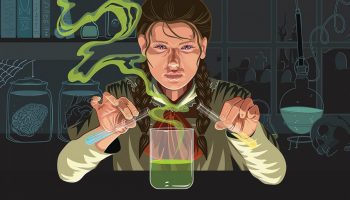What do a confused, lonely robot and Benjamin Franklin have in common? They both teach children the power of invention and discovery.
It’s a lesson that will be discussed at the CLSC Young Readers program at 4:15 p.m. Wednesday in Miller Park.
Through Peter Brown’s The Wild Robot, young readers follow a bewildered robot’s journey to discover the world around her. In Jean Fritz’s What’s the Big Idea, Ben Franklin?, they’re told the story of one of the earliest technological discoveries: electricity.
“The two books we chose show where we began and where we are now,” said Karen Schiavone, Special Studies and youth programs associate. “(They show) all aspects of our roots of innovation.”
Fritz’s story has more literal ties to Week One’s “Invention” theme, illustrating Franklin’s pivotal role in the history of modern technology. Brown, however, highlights the power of adapting to new and changing environments in an increasingly technological world.
“It’s funny how many philosophical questions spring up when we think about artificial beings,” Brown writes in an author’s note at the end of The Wild Robot. “Do we want robots that can think and feel, like a person? Would we trust robots to perform surgery, care for children, or police our cities?”
Perhaps these abstract questions were not running through Franklin’s mind when he first ventured out in a storm with his kite, but through Roz – a robot who wakes up with an encyclopedia of a brain filled with facts about other creatures, but no knowledge of her own purpose in life – Brown explores the conflict of technological advancement in a natural world.
As Roz travels the forest alone, peacefully warding off hostile animals who insist she’s “a monster,” she observes the instinctive defense mechanisms of her earthly peers. She copies the insect who finds safety through camouflage, and learns to act from the opossum that fools predators by playing dead.
“Animals have such predictable behavior, and follow such rigid routines, that at times they seem almost … robotic,” Brown writes in the author’s note. “And somewhere along the line it occurred to me that animal instincts are kind of like computer programs.”
But though Roz’s computer brain can rattle off endless facts about her fellow animals, it is through experience that she learns vital survival skills.
The CLSC Young Readers program is mimicking Roz’s experiential learning through an activity lead by STE(A)M Trucks that will follow the book discussion. The mobile makerspace provides hands-on curriculum designed to inspire children to explore STEM fields.
“Our hope is (for STE(A)M) to not only engage young people in Chautauqua, but for all of Chautauqua to see the work they’ve done and think about the role makerspaces play in our society,” said Matt Ewalt, associate director of education and youth services.
At today’s event, Jason Martin, STE(A)M executive director, said children will get a tour of the spaces and an introduction to the maker movement.
“(We’re going to) show them how they can be innovators, and then give them a chance to get their hands dirty,” Martin said.
STE(A)M’s mission is to close the opportunity gap by bringing fun, interactive lessons to public schools that don’t have the resources to do so themselves. For STE(A)M, it’s about more than providing information to students – it’s helping them unleash their unrealized potential.
As the animals in The Wild Robot tell Roz, “Everything has a purpose.”
STE(A)M is helping the future inventors find theirs.




